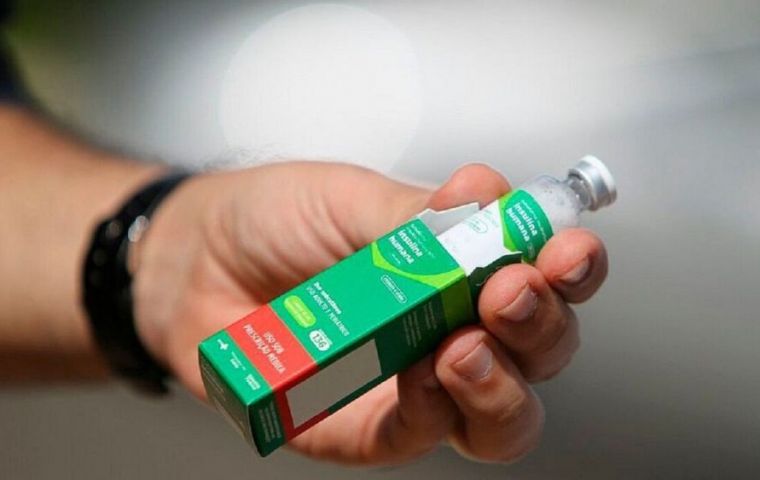MercoPress. South Atlantic News Agency
Brazil resuming local production of insulin after 20 years
 “This is BRICS in action,” said Padilha in reference to the agreement with an Indian pharmaceutical company providing the technology
“This is BRICS in action,” said Padilha in reference to the agreement with an Indian pharmaceutical company providing the technology Brazil's Health Ministry took delivery on Friday of the first batch of insulin produced through the Partnerships for Productive Development (PDP) program. The initiative is part of the National Strategy for the Development of the Health Economic-Industrial Complex and aims to resume manufacturing the drug entirely in the country.
The scientific development was made possible through technology from the Indian pharmaceutical company Wockhardt, after an agreement with the public laboratory Fundação Ezequiel Dias (Funed) and the Brazilian company Biomm.
Minister Alexandre Padilha participated in the reception of 207,385 units of the drug, including 67,317 vials of regular insulin and 140,068 vials of NPH insulin, at Biomm's plant in Nova Lima (MG).
“After more than two decades without producing human insulin, Brazil is resuming production to supply the Unified Health System and contribute to the health of the population,” Padilha said. “This is BRICS in action, changing the lives of the Brazilian population and generating jobs, income, and technology here in Minas Gerais,” he added, referring to the economic bloc that brings together large countries from the so-called Global South, including India, the country that made the partnership possible.
According to the ministry, after the total transfer of technology, Brazil will produce 50% of the demand related to NPH and regular insulins in the country's health network, known as SUS.
“An initiative like this assures patients that, regardless of any crisis — such as the one we are experiencing during the pandemic — the country has sovereignty in the production of this very important medicine. About 10% of the Brazilian population has diabetes, and some of these people need to use insulin. This ensures peace of mind, security, and stability for both the SUS and the citizens who depend on the medicine,” Padilha emphasized.
The initiative involved an investment of R$142 million (US$25.53 million) in the acquisition of the technology, with 350,000 people with diabetes expected to benefit. The contracts provide for the delivery of 8.01 million units of insulin, including vials and pens, to the public health system in 2025 and 2026.
According to the Ministry, the technology transfer process will begin after the initial acquisition, as provided for in the PDP guidelines. At the end of the transfer, the production of the drug will be entirely Brazilian, with Funed and Biomm trained to manufacture the drug in the country and supply the SUS autonomously.
In PDPs, public institutions and private companies share responsibilities for the national production of the active pharmaceutical ingredient (API) and the product covered by the PDP, in a process of reverse technology transfer. The transfer is carried out through stages that include packaging, quality control of inputs, production of the finished product, and the API in Brazil, thus enabling local production of the drug to be supplied to the SUS.
The SUS offers comprehensive care to people with diabetes, from diagnosis to appropriate treatment, according to each patient's clinical condition. The gateway to care is Primary Health Care, which provides continuous monitoring through multidisciplinary teams. Currently, four types of insulin are offered: human NPH and regular insulins and fast- and long-acting insulin analogues, in addition to oral and injectable medications for diabetes mellitus. (Source: Agencia Brasil)




Top Comments
Disclaimer & comment rulesCommenting for this story is now closed.
If you have a Facebook account, become a fan and comment on our Facebook Page!